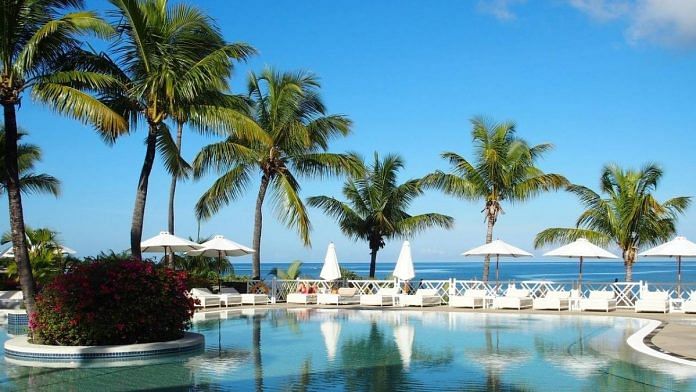Johannesburg/Port Louis: Mauritius was the first African country to get the coronavirus under control. Now its challenge is how to let the tourists that are its economic lifeblood back in.
The Indian Ocean island’s success in quelling the outbreak is unique in Africa and comes as the disease is spreading across the continent, with countries from Kenya to South Africa battling a surge in cases since movement restrictions were eased. Mauritius is one of the few places in the world that hasn’t had a locally transmitted infection in over three months. It recorded its last Covid-19 death on April 27 and has managed to keep the total number of confirmed cases to just 344.
But in a country that relies heavily on tourism, the government is under increasing pressure to reopen its airport and rescue an industry that employs almost a fifth of its workforce. It’s not without risk: The Bahamas saw infections jump after opening up to travelers in July.
“We need an opening date so that the entire industry can work toward the target,” said Paul Jones, chief executive officer of The Lux Collective, which owns six high-end resorts and hotels in the country.
Also read: Europe’s upward Covid graph sees hopes of tourism revival sink
Strong measures
The success of Mauritius, which has a population of 1.3 million, stems from the same factors that helped South Korea overcome its first outbreak: a strong central government, a well-funded health system and a containment strategy with widespread testing, contact tracing and quarantine measures. The government was among the first to require quarantine for travelers from China in January and one of few worldwide for front-line medical workers who’d been in contact with positive cases upon completion of their shifts.
“The government of Mauritius did a very good job,” said Laurent Musango, the World Health Organization’s country representative.
Mauritius closed its harbor and airport as soon as it confirmed the first three infections on March 18 and deployed police and the army to enforce a complete lockdown a week later. The government set clear guidelines as to what people were permitted to do — even restricting grocery shopping to specific days depending on people’s surnames once supermarkets were allowed to reopen.
The well-publicized deaths of both the first patient and the doctor who diagnosed him scared many into following precautionary measures, said Ramanand Jeeneea, a doctor and chief executive officer of Medicin.mu, an online platform that enables people to contact medical practitioners via WhatsApp.
“People complained a lot, especially those who found themselves stranded abroad when the borders closed without advance notice,” Jeeneea said. “But once the government set up a high-level virus committee, we all saw the results of its focused efforts. Mauritius handled it better than the U.K., where different experts are shouting about how to do it.”
Also read Indian tourists are finally out. But there’s a bigger headache than coronavirus — red tape
Under control
By May, the outbreak was under control. The country has had just 10 deaths and a handful of so-called imported cases added between May and July after returning Mauritian nationals tested positive upon arrival. More than 215,000 people have been tested, the most per capita in Africa.
At the same time, the economy is likely to shrink by a record 13% this year as tourism has collapsed and the national carrier, Air Mauritius, was placed under voluntary administration. Before the pandemic struck, as many as 1.4 million tourists per year descended on the country’s pristine beaches, accounting for 10% of gross domestic product.
A monthly 600 million-rupee ($15.1 million) wage-assistance program has softened the blow for hospitality workers, but Mauritius can’t survive without tourists, and the government is holding daily consultations to decide when to reopen and to whom.
That decision is likely to be made once the airport has been fitted with a laboratory to test visitors upon arrival. Among the options under review are the classification of tourists according to the length of their stay. Travelers who come for a week could be restricted to staying inside their resort and those who stay more than a month may be subjected to quarantine.
“We’re working hard to find a solution,” said Nilen Vencadasmy, chair of the Mauritius Tourism Promotion Authority. “It’s probably going to be done in phases. We want to keep that edge of being a Covid-safe destination.” –Bloomberg




We were born in Mauritius beau basin and left there October 1971 and would love our family to return and learn about our country in 2021 after 50 years of been in Australia. Hopefully my mum brothers and sisters and partners and children would able to afford to make this wonderful journey
There is something wrong with the comments section.
A country like Mauritius having a significant part of the economy dependent on tourism should not further delay the opening of borders. Tourists from India, Europe, Africa, etc are looking for vacations and neighbouring islands like Seychelles, Maldives, Réunion island are already wooing them. A COVID19 FREE certification before departure and subsequent testing on arrival would reduce the risk of transmission to close to zero. These are testing times and further delay in opening up the borders and restarting flights could cause widespread unemployment and be very detrimental to the economy. It would take years to bounce back from this if the right decision is not taken soon. Travel corridors and air bubbles have been found to be successful models and could be explored.
A country like Mauritius having a significant part of the economy dependent on tourism should not further delay the opening of borders. Tourists from India, Europe, Africa, etc are looking for vacations and neighbouring islands like Seychelles, Maldives, Réunion island are already wooing them. A COVID19 FREE certification before departure and subsequent testing on arrival would reduce the risk of transmission to close to zero.